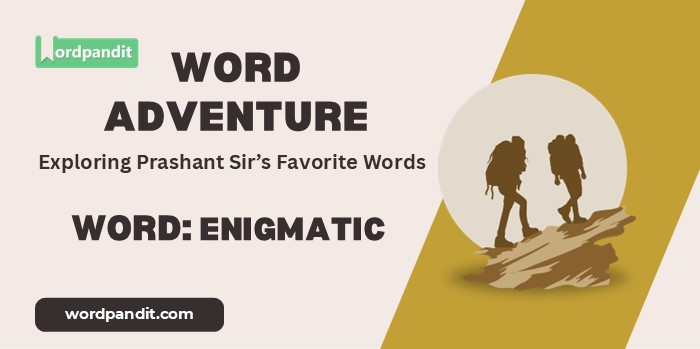Word Adventure: Enigmatic
The Headline
“Enigmatic: When Mystery Wraps Itself in a Riddle”
The Scoop
In the labyrinth of language, some words carry an air of mystery in their very essence. ‘Enigmatic’ is one such word – a term that embodies the allure of the unknown and the challenge of the mysterious. Let’s explore this intriguing word that describes what defies easy explanation.
Let’s Break It Down
The Plot Thickens
‘Enigmatic’ traces its roots to ancient Greece, where ‘ainigma’ referred to a riddle or mysterious saying. The term gained particular significance in relation to the Sphinx’s famous riddle and the cryptic pronouncements of the Oracle at Delphi.
During the Renaissance, the word evolved beyond its connection to formal riddles, coming to describe any person, situation, or phenomenon that resisted straightforward understanding. This broader meaning coincided with a growing scientific interest in decoding nature’s mysteries.
Today, ‘enigmatic’ carries a subtle distinction from similar words like ‘mysterious’ or ‘puzzling’ – it often implies a depth or complexity that makes the mystery particularly intriguing and worth solving.
Word in the Wild
The Twist
Here’s an interesting paradox: Scientists have discovered that humans are actually drawn to things that are enigmatic! Research in psychology suggests that our brains release dopamine not just when we solve mysteries, but also while we’re trying to solve them. This might explain why enigmatic people and puzzling situations often captivate us more than those that are easily understood. Perhaps being enigmatic isn’t just about being mysterious – it’s about engaging our natural desire to discover and understand!
Make It Stick
Enigmatic: When “I don’t know” becomes “I need to know!”
Your Turn
Think about the most enigmatic person, place, or thing you’ve encountered. What made it so intriguing? Did solving the mystery enhance or diminish its appeal? Share your enigmatic encounters in the comments below, and let’s explore how mysteries shape our experiences!
Down the Rabbit Hole
- Curious about famous enigmas? Research the Voynich Manuscript, crop circles, or the dancing plague of 1518.
- Interested in the psychology of mystery? Explore cognitive closure, the Zeigarnik effect, or curiosity drives.
- Want to discover more words for mysterious things? Look into ‘cryptic’, ‘arcane’, or ‘inscrutable’.
The Last Word
As we conclude our exploration of ‘enigmatic’, I hope you’ve gained appreciation for this word that celebrates the allure of mystery. In a world where information is increasingly accessible, perhaps the enigmatic reminds us that some things are worth pondering rather than immediately knowing. Until our next word adventure, this is Prashant from Wordpandit, encouraging you to embrace life’s beautiful mysteries!











